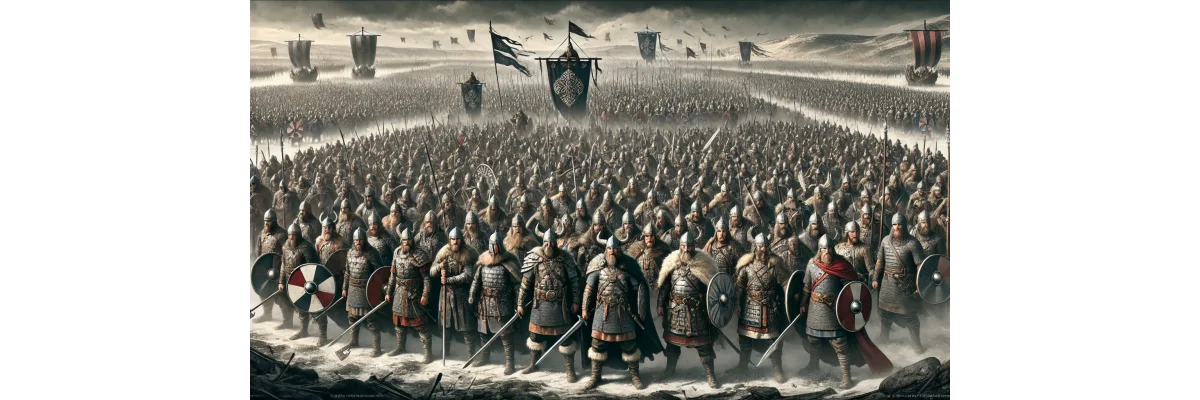The North Sea Empire: The Last Viking Kingdom
The North Sea Empire, also known as the last Viking kingdom, marks a crucial turning point in the history of the Nordic warrior culture. As the final large realm of the Viking Age, it was defined by a unique blend of military power, seafaring, and trade networks. However, despite its strategic importance and successes, the empire vanished after a series of political struggles, military defeats, and cultural upheavals.
In this blog post, we will take a closer look at the North Sea Empire of the Vikings, exploring its history, significance, and influence on the Nordic world, as well as the circumstances that led to its downfall.
The Formation of the North Sea Empire
The North Sea Empire emerged in the late 9th century as the Vikings expanded their territory across Europe, settling and conquering large areas. One of the most prominent figures in the formation of the North Sea Empire was the legendary King Harald Fairhair. Harald I of Norway united many small Viking kingdoms in Norway and Scotland through his conquests, laying the foundation for the future empire.
The empire eventually spread along the coastal regions of the North Atlantic, particularly in what is now Norway, parts of Britain, Ireland, and the Shetland Islands. Access to rich trade routes in the North Atlantic and military power made the North Sea Empire an important political and cultural force in the Nordic world.
The Military Strength of the North Sea Empire
The North Sea Empire was particularly known for its warriors and legendary ships. The Viking longships, with which the empire conducted military expeditions, were a true masterpiece of seafaring. These ships allowed the Vikings to venture far and wide, engaging in battles on the coasts of Europe, the Mediterranean, and even North Africa.
The military strategy of the North Sea Empire was based on swift, well-organized raids and military conquests. The Vikings, led by powerful rulers like Harald Fairhair and later his successor, the famous Harald Hardråde, launched campaigns against neighboring kingdoms and rival Viking tribes.
But the empire grew not only through wars and conquests. Trade relations and control over important trade routes also contributed to the economic success of the North Sea Empire. The Vikings frequently traded metals, furs, grain, and other valuable goods, strengthening their economy and providing financial resources for military campaigns.
The Influence of Viking Culture
The North Sea Empire was not only a military and economic powerhouse but also a cultural hub of the Viking Age. The gods and Norse mythology played a central role in the daily lives of the people of the North Sea Empire. Religious life was deeply connected to the ancient Viking traditions, particularly the belief in Odin, Thor, and Freyja.
Viking warriors, known as Einherjar, sought to enter Valhalla and fight alongside the gods. The pursuit of glory and honor was a central tenet of the Nordic worldview that shaped the North Sea Empire.
Social structures within the empire were strongly hierarchical. Kings and nobles stood at the top, while farmers and merchants made up the backbone of society. Religious leaders, shamans, and seers held great influence and were often seen as mediators between the gods and the people.
The Fall of the North Sea Empire
Like many other Viking kingdoms, the North Sea Empire experienced a dramatic decline. The death of Harald Hardråde in 1066, when he was defeated at the Battle of Stamford Bridge by the Anglo-Saxons, is often seen as the end of the North Sea Empire. Though his successors attempted to stabilize the empire, political instability, internal power struggles, and growing threats from the Anglo-Saxon and Norman kingdoms led to its collapse.
The transition from the Viking Age to the Middle Ages brought new challenges, including the rise of Christianity and the transformation of Nordic society. The old Viking traditions and military power gave way to a new era of political organization and religious change.
The Legacy of the North Sea Empire
Despite its fall, the North Sea Empire left behind a lasting legacy. The Vikings, once known as raiders and conquerors, played a major role in spreading trade, technology, and culture across Europe. Their ships and navigational skills revolutionized seafaring, and their discoveries in previously unknown parts of the world influenced the development of trade and communication.
The legacy of the North Sea Empire also lives on in Nordic culture, literature, and mythology. The tales of the warriors, gods, and life in the North Sea Empire are recorded in the Eddas and other Nordic sagas and continue to be an important source of understanding the Viking Age.
Conclusion
The North Sea Empire was the last great state of the Vikings and marked the final stage of an era defined by military expansion and cultural exchange. While the empire itself was destined for decline, its legacy remains a symbol of the strength and influence of the Vikings. Today, the North Sea Empire represents a fascinating chapter in history that continues to live on in the sagas and myths of Nordic culture.


 German
German














